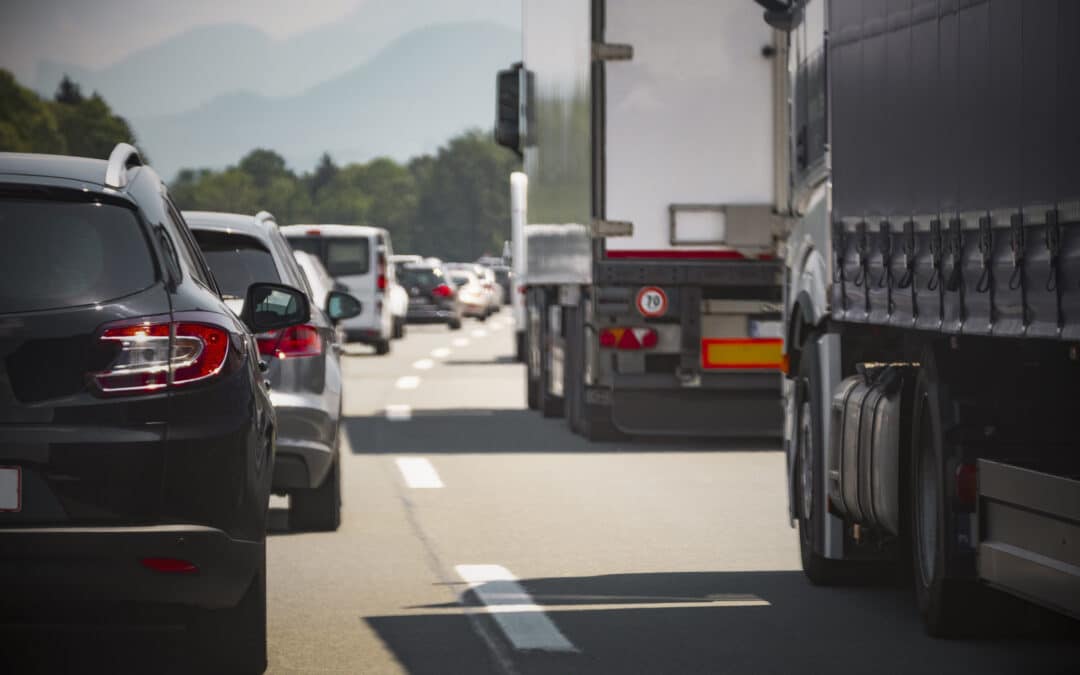When you are hauling a semi trailer—especially a loaded semi trailer—perhaps no component on your rig is more important than the brakes. If a problem arises with the truck’s engine and it won’t run, that can be inconvenient and cause you to miss a deadline. If the brakes on your truck and/or semi trailer go out, that can be deadly.
At a minimum, a truck with inhibited braking ability has the potential to cause significant property damage and may cause injuries, as well. That’s why whether you are hauling your own semi trailer or a rented semi trailer, you should ensure that the brakes are properly installed and maintained, and also inspected before each trip.
The Physics of Truck and Semi Trailer Braking
As most drivers know, when you apply the brakes in your rig, the brake calipers press brake pads against the brake discs. This occurs on all wheels on the truck and the semi trailer.
The pressure of the brake pads on the brake discs converts the kinetic energy of the rig into friction, and that friction slows and ultimately stops the vehicle. Friction also produces heat, so under any conditions, brakes get hot. If you have ever made the mistake of touching parts of the brake system soon after a vehicle has been in use, you know this!
However, both aggressive driving and problems in the braking system can cause brakes to overheat. Brakes are meant to be applied gradually and sparingly, with actions like downshifting and leaving plenty of distance between your rig and the vehicle in front of you making it so that you don’t have to brake as frequently. But if you ignore that advice and, instead, brake vigorously and often, or for an extended period like on a long downhill descent, excessive heat can be produced.
When that happens, what’s sometimes referred to as “brake fade” can occur. Brake fade is when you find that applying the same amount of pressure to the brake pedal as previously no longer provides the same amount of stopping power. In a worst-case scenario, you can find yourself with essentially no braking capability.
The physics of overheated truck and semi trailer drum brakes, for instance, has to do with the temperature in various parts of the brake system—specifically the overall temperature of the drum, the overall temperature of the friction material (i.e., the brake pad), and the temperature at the contact point between the friction material and the drum. When these temperatures get too high, braking capacity is decreased—or more to the point, stopping distance is increased.
The design of air disc brakes (ADBs) reduces the risk of overheated brakes somewhat. But any type of brake can overheat.
Signs Your Truck and Semi Trailer Brakes Are Overheating
How will you know if the brakes on your truck and/or semi trailer are overheating? The first thing to be aware of is how you are driving. If you find yourself having to brake frequently because you are staying too close to the vehicle in front of you for your speed of travel, you should pay more attention to the signs of overheating brakes since you are creating the right conditions for it. The same is true if you are driving on a long downhill stretch and are not downshifting as you should be.
And, of course, if your brakes or braking system have been serviced recently, you should be alert to the possibility of problems.
Often, one of the first signs of overheating brakes is, as noted above, brake fade—meaning the decreased effectiveness of your braking system. Smart drivers don’t ignore this symptom and simply compensate by pressing harder on the brake pedal. They get the truck and semi trailer brakes checked right away.
Another sign of overheating brakes is a loud, squealing noise when braking. This can occur when aggressive breaking causes changes to the surface of a brake pad. The smell often described as being like burning carpet is another indication of overheating. It’s an odor that’s hard to miss. And while you might want to attribute it to one of the vehicles around you, if the smell persists, it’s probably your brakes that are producing it.
Finally, if you see smoke coming from your brake pads, that is a clear indication that the system is overheating. In fact, while it is not common, brake pads can catch fire.
Preventing Overheated Brakes on Trucks and Semi Trailers
Preventing overheating and loss of braking capability starts with ensuring that your brakes are properly installed, adjusted and maintained. On your trucks and owned semi trailers, your mechanics will surely take on this responsibility. If you rent or lease a semi trailer from Boxwheel, we ensure that every trailer that leaves our lot is in peak operating condition. Even so, double-checking the brakes on any rented semi trailer is a good idea.
In addition to confirming that your brakes have been installed and serviced properly, you should also perform an inspection before every trip. In the same way that a pilot inspects their plane before takeoff, you should examine your brakes before hitting the road. That is a good habit to get into even if your mechanic does their own inspection.
You should also prevent overheating by using good driving practices. That includes leaving ample space between your rig and the vehicle in front of you and relying on slow, steady deceleration rather than fast, forceful stopping.
And on downhill stretches, downshifting and letting your engine slow your truck and semi trailer is very important. If you frequently drive in the mountains, it is also a good idea to know where the runaway truck ramps are and to understand how to use them to stop your rig if you lose your brakes.
Use the Best Equipment Available
A final word of advice on trucks, semi trailers and braking is to use the best equipment available. Hauling an old trailer with questionable brakes can lead to disaster. Using a professionally serviced and maintained rental or leased trailer, on the other hand, means you can be confident that its brake systems, like its other systems, are in good working order.
If you have questions about our inventory of flatbeds, dry van trailers, liftgate trailers and refrigerated trailers for rent or lease, we are happy to answer them. Contact us today!

